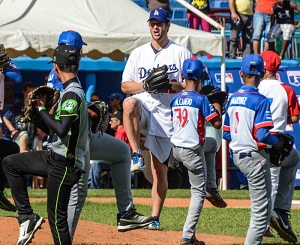 “I came to Cuba to understand the passionate baseball played here.” (Clayton Kershaw, December 2015)
“I came to Cuba to understand the passionate baseball played here.” (Clayton Kershaw, December 2015)
“It’s gratifying to be in this country, which has so much history in sports.” (Shaquille O’Neal, June 2016)
The first, a left-handed pitcher who is a major league baseball star, with three Cy Young awards ,the highest distinction for a pitcher, and seven consecutive appearances in All-Star Games. The other, a dominant center in U.S. professional basketball (NBA) for 19 seasons.
They came to share their skills with Cubans, in an unprejudiced atmosphere, amid smiles and jokes like those O’Neal played on the court located at 23rd and “B” in the Havana neighborhood of Vedado. Kershaw’s joy and ability were evident during children’s clinics at the Victoria de Girón and Latinoamericano stadium.
They and others, like basketball players Steve Nash and Dikembe Mutombo, have come, regardless of the pressure. All those who came to the island’s to work with young athletes returned to the United States satisfied with having contributed to a rapprochement that had been denied for decades, and were grateful for the kind treatment received by the delegation that included baseball players who had left Cuba and were playing in the U.S. major leagues.
Who was harmed by this exchange? Was Cuba hoping to gain some advantage? These were encounters to which our country opened its doors, as a way to get to know each other better, to show that, even when there are differences, it is possible to establish a respectful relationship between two neighboring peoples.
Nothing was more alien to that intention than the abrupt rupture imposed by the Donald Trump administration, with the approval of then-National Security Advisor, John Bolton. In the book about his time in the White House, released recently in the United States, he wrote about the Treasury Department revoking the license that allowed for an Agreement between the Cuban Baseball Federation and the MLB:
“This action did not win us the affection of owners (of MLB teams), but they were mistaken if they did not understand that the participation of Cuban baseball players in professional baseball meant sleeping with the enemy. Thus Bolton supported his master and revealed his true self, a character who, although “scared off” from the White House, remains an unrepentant hawk.
The agreement not only included the proposal that Cuban players could prove themselves in major league baseball, where, during the decades preceding the Revolution, others, like Orestes Miñoso, brought what Kershaw himself recognized as passionate baseball. He added: “Passion can make a difference on the field, and that’s where Latinos are very intense.”
Just as important, if not more so, than the interest in playing in the MLB, was the determination to end human trafficking, to banish, once and for all, incitement of our players to leave the country where they studied and developed, prospects who on more than one occasion faced extortion on the part of unscrupulous “agents,” active to the lucrative business of illegally moving human beings, even at the risk of their lives.
In his text, Bolton shows the pragmatism of U.S. magnates and politicians, only endorsing what is useful for their businesses. Thus, he confesses that he was supportive of Trump’s obsession with undoing everything that the previous administration had proposed with respect to relations with Cuba, after recognizing that the blockade has not subdued its people, and is repudiated by the entire world as an example of obsolete and failed use of force.
With his phrase “sleeping with the enemy,” Bolton is ignoring the nobility of Cuban sports, which considers the U.S. people and athletes our friends. That barb can be chalked up as a wild pitch for Bolton.
(Source: Granma)